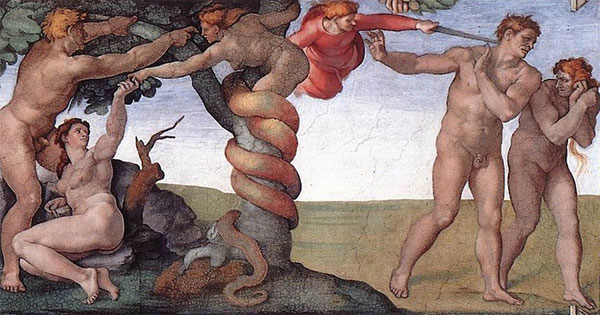
Detail from the Sistine Chapel by Michelangelo, via wikimedia.org
In the churches I grew up in, the story recounted in Genesis 3 was viewed as the moment when sin–Original Sin–entered humanity. In that story, a serpent persuades Eve to eat from the Tree of the Knowledge of Good and Evil. She does. And so does Adam. These events were called The Fall, a theological tragedy that resulted in our Sin Nature, severed our relationship with God, and created a need for a Savior who could save us from our sin and restore our relationship with God so that we would not burn in hell when we die.
This interpretation of Genesis 3 is common, but is it supported by the text? Here are 11 observations about the Genesis 3 story and its characters (because this one goes to 11):
- Traditionally, the serpent in this story is viewed as Satan or the Devil. But it is important to recognize that Genesis 3 never equates the serpent with Satan. There’s not even an implication that the two are the same.
- In the ancient world, serpents were common symbols of wisdom, rebirth, and eternal life. Is it surprising that a serpent shows up in Genesis 3? Is it surprising that this serpent is talking about not dying and being like God and knowing all things?
- Genesis 3 does not contain any Hebrew words that translate to “sin.” The first instance in the Bible of a Hebrew word that translates to “sin” is in Genesis 4 when God is speaking to Cain.
- The term “Tree of the Knowledge of Good and Evil” contains a merism. A merism is a rhetorical tool in which two contrasting terms are combined to refer to an entirety. In this case, the contrasting terms “good” and “evil” are combined to mean “everything.” The meaning of the term is thus “Tree of the Knowledge of Everything.”
- When Eve took the fruit, she wanted to gain wisdom. Is this a malicious or rebellious choice? It doesn’t appear that way in the text–it seems that Eve wants to be more like her Creator.
- When God comes looking for Adam and Eve after they eat, he does not seem angry with them. In their initial conversation, Adam and Eve act like embarrassed children who have been caught by their parent as they pass the blame around.
- God curses the serpent, not Adam and Eve.
- God tells the humans that their lives will now be more difficult because of what they have done.
- God creates coverings of skin for Adam and Eve. It seems that God realizes the shame that they feel in their nakedness and he moves towards them and provides them with coverings so that they do not need to feel their shame any longer.
- God says that Adam and Eve have become “like one of us in knowing good and evil.” (Another merism–this actually means “knowing all things.”)
- God says nothing about a severed relationship between divinity and humanity in this passage.
So, what should we make of these observations?
First, this isn’t a story about Original Sin. Eden is a symbol for innocence and harmony. The Tree of the Knowledge of Good and Evil is a literary device that conveys the idea of a gateway from innocence to awareness. When God (the parent character) tells Adam and Eve (the children characters) not to eat from the Tree, the original audience for this story would have known exactly what Adam and Eve would do. What do children immediately want to do when they are told not to do something? They want to do it!
Are parents surprised when their children disobey them? Of course not. Every parent knows that a child’s innocence cannot be maintained forever. And along with a child’s loss of innocence comes a greater awareness of difficulty and complexity in life. This understanding is echoed in Genesis 3.
Adam and Eve eat the fruit and become like God, knowing all things. Is this bad? God never says that it is. God tells Adam and Eve that their actions will result in greater difficulty in life, but isn’t that the natural progression of things? Isn’t that what happens when you move from innocence to awareness?
Awareness brings with it the ability to choose what kind of life to lead. I can choose negativity in the form of selfishness, jealousy, greed, materialism, pessimism, or violence. I can also choose to cultivate love, joy, peace, and patience. But which is easier?
Modern psychology is getting better at explaining our tendency towards the negative by revealing that human beings have an innate negativity bias. Is this why it’s easier to become resentful? Easier to feed on negative media than positive? Easier to tear things apart than it is to restore what was broken? If negativity is the standard way the mind operates, if Jesus teaches that the mind is the root of sin, and if Paul teaches that we can be transformed by renewing our mind, then I have to wonder if our supposed “sin nature” is really just an ancient way of saying “negativity bias.”
It’s time to move beyond the theological impositions that are commonly placed on the Genesis 3 story. Any talk about The Fall, Original Sin, Total Depravity, or a severed relationship with God is foreign to Genesis 3–that kind of language just isn’t there in the text. Instead, Genesis 3 is a reflection of the difficulty that the awareness of our negative tendencies brings. It asks us what we will do with that awareness–a challenge that we all must face as we progress through life.
 About Daniel Verona
About Daniel Verona
Daniel Verona is a graduate student in biomedical engineering at Texas A&M University. When he is not busy doing literature review or data collection, he enjoys music production, snowboarding, long walks, and Indian food.
Leave a Reply